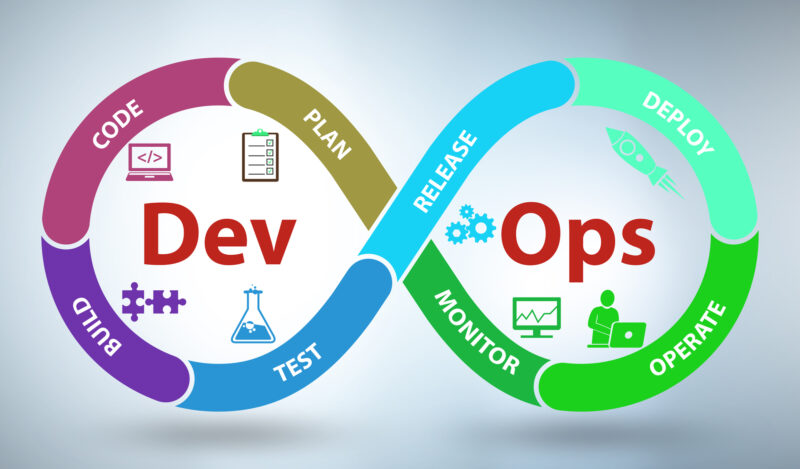
Il DevOps è un approccio agile e vantaggioso pensato appositamente per le aziende e i team di sviluppo che cercano reattività e una migliore orchestrazione dei processi.
Ha oggi un ruolo fondamentale nel mondo della programmazione ed è indispensabile per coordinare risorse, persone e tecnologie per offrire il meglio al cliente finale.
Di cosa si tratta esattamente? Quali sono i concreti vantaggi che offre?
Vediamolo nel dettaglio in questo articolo.
Indice dei contenuti
Cosa si intende per DevOps?
DevOps è un termine che nasce dalla parola Development – che significa sviluppo – e Operations, ossia operazioni.
Indica un insieme di principi, pratiche e procedure che assicurano collaborazione e sinergia per garantire ai clienti i migliori prodotti e servizi spiccando sulla concorrenza.
Il DevOps è infatti un modello con l’obiettivo di migliorare l’agilità aziendale accelerando i processi e combinando le risorse per ottimizzare lo sviluppo di software e applicazioni.
Si occupa di implementare modalità di lavoro collaborative, include pratiche di analisi dei dati e comprende ogni aspetto legato alla sicurezza. Oltre a operare per un’evoluzione generale dei processi di sviluppo e della gestione dell’infrastruttura.
DevOps, ecco come funziona
Perché un modello di tipo DevOps funzioni con efficacia, è necessario innanzitutto disporre di team di esperti dedicati allo sviluppo e alla produzione: i due team collaborano agendo unitariamente e non c’è una separazione netta delle responsabilità o delle competenze.
In certi casi i due reparti vengono addirittura fusi in un unico gruppo di lavoro, in modo che i tecnici possano seguire attivamente un’applicazione lungo tutto il ciclo di vita, dallo sviluppo alla distribuzione.
Il DevOps si basa inoltre su un alto livello di automazione e richiede un utilizzo dinamico dell’intera infrastruttura possibile grazie a scalabilità e provisioning flessibile.
Il codice viene modificato con più frequenza e le tecnologie e gli strumenti utilizzati sono all’avanguardia e capaci di evolvere le applicazioni in maniera affidabile e con rapidità.
L’intervento umano è quindi profondamente ridotto rispetto ai metodi tradizionali e a un ambiente di sviluppo standard, apportando maggiore efficienza e grande agilità dei processi.
Grande attenzione viene data infine alla sicurezza e al controllo qualità:due aspetti presi in considerazione durante ogni operazione, tanto da dare vita al cosiddetto team DevSecOps quando diventano il vero punto focale dell’intero approccio.

Perché adottare questo modello di sviluppo?
Quali vantaggi porta in azienda un approccio di tipo DevOps?
Grazie a questo modello si supera la concezione di divisione dei ruoli, favorendo una collaborazione tra reparti inerenti allo sviluppo, al controllo qualità, alla sicurezza e a tutte le operazioni IT.
Professionisti prima isolati hanno ora la possibilità di coordinarsi tra loro, orchestrando i processi per fornire prodotti migliori, servizi più efficaci e maggiore affidabilità.
Così facendo diventa più facile rispondere alle esigenze dei clienti e perfezionare le applicazioni sviluppate per raggiungere gli obiettivi aziendali in tempi più rapidi.
Approccio DevOps: tutti i vantaggi
Analizzando meglio i vantaggi garantiti dal DevOps troviamo:
- Velocità: l’azienda beneficia di maggiore agilità ed è più facile puntare all’innovazione. Ci si adatta meglio all’evolversi del mercato e l’efficienza si potenzia notevolmente. Anche gli aggiornamenti sono rilasciati a intervalli più brevi.
- Distribuzione rapida: le nuove funzioni sono rilasciate con più rapidità e frequenza e i bug vengono corretti tempestivamente. Si ha una marcia in più rispetto alla concorrenza ed è più facile andare incontro alle necessità dei clienti.
- Affidabilità: ogni volta che si esegue una modifica o un aggiornamento si assicura totale conformità agli standard di sicurezza inerenti alle applicazioni e all’infrastruttura. Si sfruttano funzioni come integrazione continua e distribuzione continua per garantire la massima funzionalità senza trascurare affidabilità e produttività.
- Scalabilità: variazioni e aggiornamenti sono possibili grazie a un alto livello di automazione e coerenza. I rischi sono contenuti e l’efficienza è garantita.
- Migliore collaborazione: i team interagiscono dando vita a flussi di lavoro integrati e condivisi. In questo modo i tempi di esecuzione si riducono, le cause di inefficienza diminuiscono e gli sviluppatori e il reparto di produzione possono accingere a maggiori risorse.
- Sicurezza: c’è grande attenzione alle policy di conformità automatizzate, i controlli sono sistematici e la configurazione è gestita minuziosamente.
Il ruolo chiave della cultura aziendale
Per implementare un modello DevOps con efficacia, è necessario che alla base ci siano la giusta mentalità e una cultura aziendale adeguata.
In particolare è utile allinearsi ai principi open source, adottando un metodo di lavoro che sia agile e trasparente in ogni sua fase.
Questo tipo di approccio prevede infatti la libera condivisione delle informazioni e lo sviluppo di processi decisionali chiari e comprensibili.
La collaborazione diventa indispensabile e il timore di sbagliare viene accantonato in favore di un desiderio di sperimentazione possibile grazie a un clima di totale fiducia.
È quindi importante che questa nuova visione gestionale non rimanga circoscritta a determinati reparti, ma si estenda nell’intera azienda creando sinergia e una strategia di lavoro unificata verso i medesimi obiettivi.
Desideri parlare con un nostro esperto? Contattaci
Ultime News Data Center
-

-

-

Quali sono le differenze tra SQL Server e Oracle?
13 Maggio 2024 -

Cos’è e come fare monitoraggio di Microsoft SQL Server
23 Aprile 2024 -

Guida SQL Server, tutto quello che devi sapere
19 Aprile 2024 -

-

-

FaaS: Cos’è, Come funziona, Vantaggi, Casi d’uso ed Esempi
26 Febbraio 2024 -

Cos’è un server, come funziona, tipologie
15 Febbraio 2024 -

Data Governance: Cos’è, Importanza, Strumenti e Best Practices
13 Febbraio 2024
Sviluppo e integrazione IT
-

-

-

Provisioning: la tecnologia che cambia il mondo delle telco
14 Settembre 2022 -

-

-

Machine Learning e Deep Learning: quali sono le differenze?
6 Ottobre 2021 -

Deep Learning: la parte più profonda dell’Intelligenza Artificiale
27 Settembre 2021 -

Kubernetes: la piattaforma ideale per gestire i container
24 Luglio 2021 -

-






















